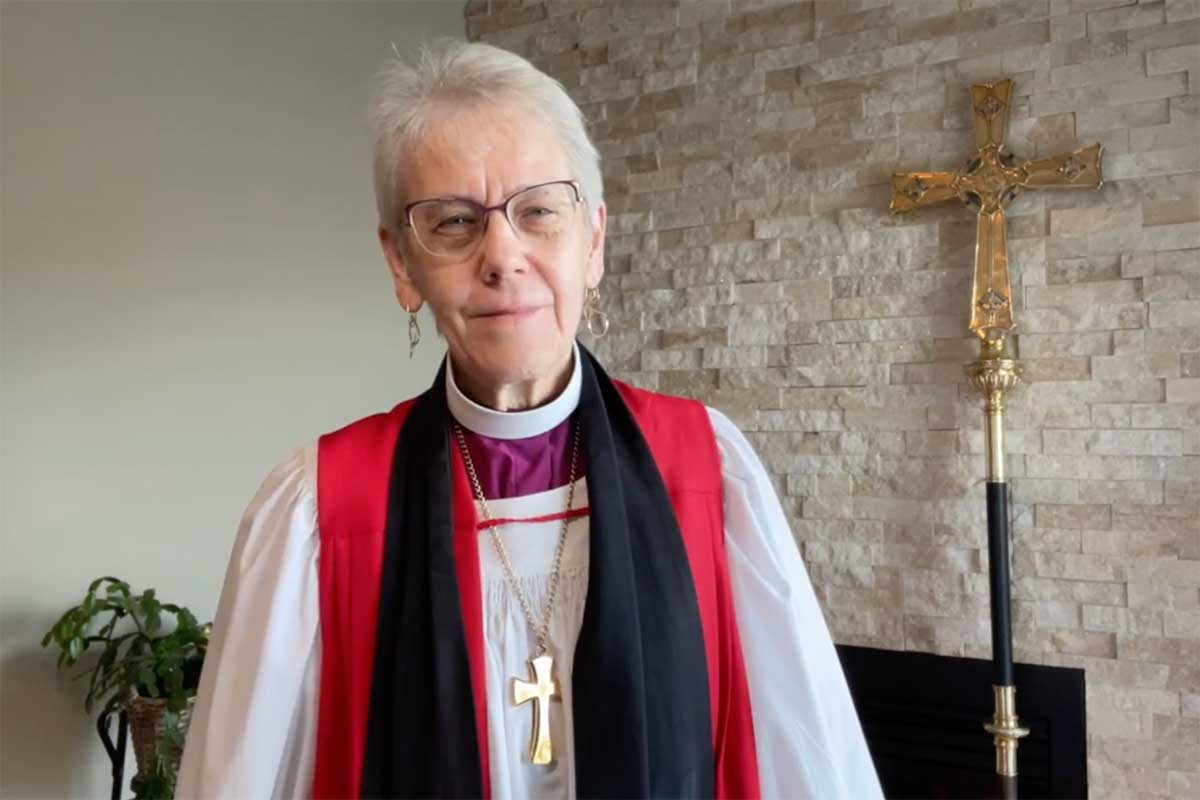Although the Omicron wave of the pandemic prevented Archbishop Linda Nicholls, Primate of the Anglican Church of Canada, from travelling to Ottawa for the New Year’s Day service at Christ Church Cathedral commemorating the 125th anniversary of the founding of the Anglican Diocese of Ottawa, she delivered her homily in a recorded message.
The archbishop said she was disappointed that she could not be at the Jan. 1 service in-person but added “we live in hope for next year.”
She began by drawing a parallel between New Year’s traditions of reflecting on the year past and looking to the one ahead, often with resolutions, and the way anniversaries are observed. “Anniversaries call us to reflect on the past and the present and ask how they inform our commitment to the future,” she said.
Although Christians are inevitably influenced by the social and cultural values of the secular world around them, the archbishop reminded her listeners: “We are also children of God, baptized followers of Jesus Christ, committed to see ourselves and the world through the lenses of God’s values, and that changes everything.”
The archbishop said that whenever she meets with baptismal or confirmation candidates, she invites them to remember the baptismal covenant and to return to it as the touchstone for reflecting on their lives whenever they are unsure or need to reaffirm their commitment. “So, I invite you today to join with me in reflecting on that covenant in the light of the past year, the history of your diocese, and the beginning of this new year.”
The baptismal covenant begins with the declaration in the Apostles’ Creed, which summarizes “what we believe about God, about Jesus and the Spirit,” she said. “This is God’s world—created, loved, redeemed. That may be hard to reconcile with the events of the past year, with all of the suffering we have seen or experienced through the pandemic, through natural disasters brought on by climate change, and so much uncertainty in every part of our lives,” Nicholls acknowledged.
That is why the Creed is followed by the six questions that declare how we will live to witness to what we have just said in the creed, she said. The questions are:
Will you continue in the apostles’ teaching and fellowship, in the breaking of bread, and in the prayers?
Will you persevere in resisting evil and, when you fall into sin, repent and return to the Lord?
Will you proclaim by word and example the good news of God in Christ?
Will you seek and serve Christ in all persons, loving your neighbour as yourself?
Will you strive for justice and peace among all people, and respect the dignity of every human being?
Will you strive to safeguard the integrity of God’s creation and respect, sustain, and renew the life of the earth?
The liturgical response to each is “I will, with God’s help.”
“How we live into these questions engages our lifestyle, our financial management, our political choices, our public engagement,” Nicholls said.
The idea of the common good is embedded in the gospel, she added. “It is why we must be concerned about vaccine equity for the globe, not just for Canadians. We must care about clean water for all people. We must pay attention to the impact of our waste in other parts of the world. We must care about justice and peace and the dignity of all people. It is why we vote in ways we believe will make that possible, why we advocate with governments for social change for the good of all, for housing, addiction needs, and why we take a casserole to a sick neighbour, shovel the driveway of an elderly parishioner, give respite to a harried mother or a burdened caregiver.”
Nicholls paid tribute to Archbishop Emerita Desmond Tutu, the former Archbishop of Cape Town, as someone “who embodied his baptismal faith fully and passionately, always exuding joy in life, attentive to all whom he met, rich or poor, black or white or brown, young or old, challenging to any injustice wherever it was found, and faith-filled.”
“Every diocese has its own DNA,” the Primate said, observing that the Diocese of Ottawa has been “infused with a commitment to the community through ministries that pay attention to the wellbeing of those around you. That commitment to the common good is embedded in your life.”
She added that she knows the Diocese is “in the midst of discerning strategic direction for parish ministry as we face radical shifts in engagement with traditional models of church,” and offered this encouragement. “None of the baptismal promises require a particular model of church structure or building or ministry in order to be fulfilled. The challenge is to release our expectations and open minds and hearts to the creativity of the spirit.”
Echoing Bishop Shane Parker’s description of the Diocese as “strong, resilient and resource-filled,” she asked what the diocese would look like in 2022? “It will require every member living daily in their baptismal promises, caring for the common good, and living joyfully with God,” she said.
She closed praying, “May God, who has granted you the courage to make these promises, grant you the strength and resilience to live into them each day in your family, work, parish, and diocese. Amen.”


Saint Mary’s Church, Westmeath — Deanery of the Northwest